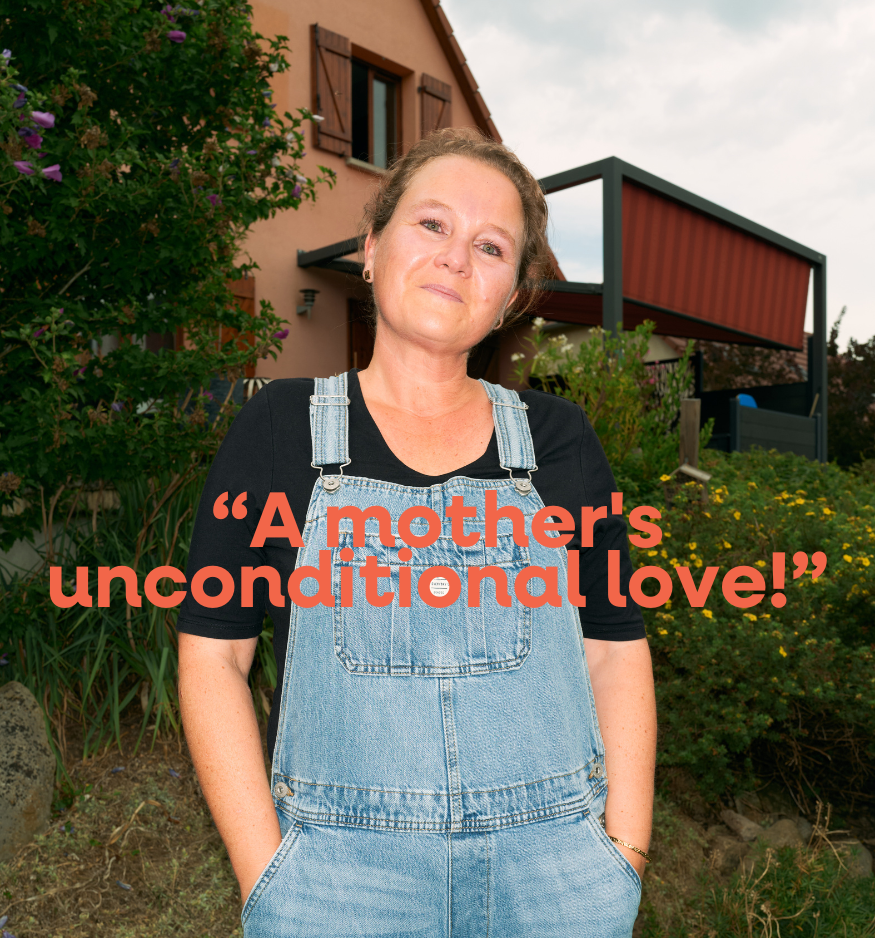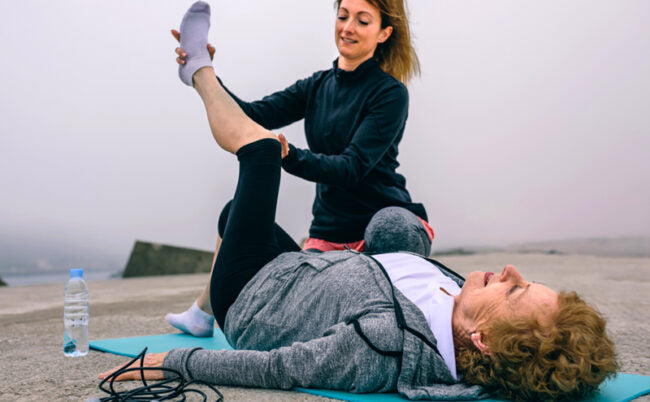Lower abdominal pain in menopausal women (regardless of your age) is a common discomfort that often causes concern. After menopause, the female body undergoes significant hormonal and muscular changes that can explain the onset of pelvic or abdominal pain. While some sensations are mild and temporary, others should raise alarm. Understanding the possible causes, recognizing warning signs, and adopting appropriate solutions helps preserve your intimate health and quality of life after menopause.
Why do you experience lower abdominal pain after menopause?
Menopause marks the permanent end of menstruation and a significant drop in estrogen levels. These hormonal changes have a widespread impact on the body. They affect muscle tone, tissue elasticity, intimate hydration, and the function of pelvic organs.
As a result: pain or pressure sensations may develop in the lower abdomen, sometimes accompanied by other urinary, digestive, or gynecological symptoms.
What causes lower abdominal pain in menopausal women?
Hormonal changes related to menopause (at any age)
The decrease in estrogen weakens tissues and can cause diffuse pain: pulling sensations, cramps, pinching feelings, or pelvic discomfort. These pains may appear as early as perimenopause and persist after menstruation stops. They are sometimes similar to menstrual cramps, even without a menstrual cycle.
Learn more about hormonal changes.
Pelvic floor relaxation and muscle tone loss
With menopause, the pelvic floor muscles naturally lose tone. The pelvic floor plays a key role in supporting pelvic organs (bladder, uterus, rectum). When it weakens, it can cause a feeling of heaviness or pressure in the lower abdomen, discomfort, and sometimes painful sensations that increase throughout the day’s activities.
This relaxation is often linked to urinary leakage, discomfort during physical effort or walking, and daily inconvenience. Pelvic floor training exercises should be considered as a first step to strengthen the pelvic floor and reduce feelings of heaviness.
Learn more about muscle tissue relaxation.
Intimate dryness and pelvic discomfort
The drop in estrogen leads to a decrease in natural lubrication and mucous membrane hydration. This intimate dryness can affect the vagina and vulva, causing irritation, inflammation, and pelvic pain, including outside of sexual intercourse. It also increases the risk of urinary infections, often responsible for lower abdominal pain.
Urinary disorders and pelvic pain
After menopause, the bladder can sometimes become more sensitive and less toned. This may result in frequent urges to urinate, burning sensations, or lower pelvic pain. Urinary infections are also more common during this stage of life and should be promptly treated with appropriate care.
Learn more about pelvic pain.
Digestive issues after menopause
Bloating, gas, slower digestion, or intestinal cramps can also explain lower abdominal pain. Hormonal changes affect intestinal transit and digestive sensitivity. These issues are generally mild and temporary but can increase abdominal discomfort.
Less common causes not to overlook
In some cases, lower abdominal pain in menopausal women may be linked to more serious conditions:
- Ovarian cysts, sometimes causing pulling sensations or sharp pain.
- Prolapse (organ descent), caused by pelvic floor weakening, which can lead to a feeling of heaviness, pelvic pain, or a sensation of pressure or heaviness—sometimes painful in the lower abdomen. Learn more about prolapse.
- More rarely, some gynecological conditions require urgent medical attention.

I take care of my pelvic floor
There are various causes of lower abdominal pain in women aged 50, 60, or 70. So, consult a doctor to better identify them and implement the right solutions.
Pelvic pain at menopause: when should you consult?
It is recommended to see a healthcare professional if you experience any of the following:
- intense, persistent pain or pain that worsens
- an unusual sensation of heaviness or pressure in the vagina or lower abdomen
- urinary leaks associated with pain
- bleeding after menopause
- pain during sexual intercourse
A medical diagnosis helps identify the exact cause and implement appropriate care. Find all our advice in our "Better Living with Menopause" section.
How to relieve lower abdominal pain after menopause?
Recommended natural solutions
In many cases, simple measures provide effective relief from pelvic pain:
- engage in regular physical activity (gentle exercise or walking) tailored to maintain muscle tone and establish a fitness routine
- maintain a stable weight to reduce pressure on the abdominal and pelvic area
- ensure good hydration and, if needed, use intimate moisturizing products
- adopt a balanced diet to minimize digestive issues
Strengthen your pelvic floor after menopause
Strengthening the pelvic floor is a key factor to reduce pelvic pain, prevent urinary leaks, and limit the risk of organ prolapse.
Pelvic floor training, performed with a healthcare professional or at home using a biofeedback pelvic floor trainer like Emy Trainer, effectively tones this crucial area at any age. This medical device helps you better connect with your pelvic floor and train effectively for lasting results. After a clinical examination with a healthcare professional, you can incorporate it into your daily routine.
Possible medical treatments
When pain is more severe or persistent, medical treatment may be considered:
- hormone replacement therapy, prescribed by a doctor in certain cases (hot flashes)
- specialized care for significant urinary or pelvic disorders
- surgical intervention, reserved for more severe cases such as advanced prolapse
Anticipate and prevent pelvic pain during menopause
Adopting a healthy lifestyle from your forties helps reduce the impact of menopause on the pelvic floor and lower abdomen. Regular physical activity, pelvic floor training, and paying attention to your intimate health are key to navigating menopause more calmly. The crucial role of healthcare professionals in helping reduce the effects of menopause.
FAQ – Abdominal pain and menopause
Why does menopause cause diffuse pain in the lower abdomen in menopausal women?
During menopause, a woman’s body undergoes a major hormonal change, marked by a significant drop in estrogen levels. These hormones play an essential role in the tone of pelvic tissues, muscle flexibility, and blood flow in the abdominal and pelvic areas.
When their levels decrease, support structures such as the uterus, pelvic floor, and deep pelvic muscles become more sensitive. This can cause a diffuse pain in the lower abdomen, felt as discomfort, pressure, or abdominal tension.
👉 This pain is not always a sign of a serious problem but often reflects the body’s adaptation to this new hormonal phase.
What is the real cause of pulling or cramping sensations in the pelvic area after menopause?
Pulling, cramping, or pelvic tension sensations are mainly linked to changes in hormone-dependent tissues. The drop in estrogen causes a loss of elasticity in muscles, ligaments, and the vaginal lining.
The pelvic floor may also lose tone, altering the balance of pelvic organs and causing unusual sensations in the lower abdomen, sometimes worsened by a lack of appropriate physical activity or prolonged postures.
Why do some women feel pain in the ovary area after menopause?
After menopause, the ovaries stop their hormonal activity but remain present in the body. Ovarian pain can be linked to ligament tension, a local inflammation or increased sensitivity of the surrounding tissues.
For some women, gynecological history such as endometriosis, previous cysts, or inflammations can explain persistent pain after the end of menstruation.
👉 Any persistent or unusual ovarian pain should prompt a consultation with a doctor to rule out a gynecological cause requiring medical diagnosis.
Why does a feeling of abdominal bloating or tension occur at this stage of life?
Bloating at menopause is a common symptom. It results from slowed intestinal transit, changes in fat distribution, hormonal decline, and increased digestive sensitivity.
The drop in estrogen directly affects the digestive system, causing bloating, gas, and sensations of fullness, especially towards the end of the day.
Stress, a sedentary lifestyle, and certain eating habits can worsen abdominal tension.
Can stress, fatigue, or a period of high tension worsen abdominal pain?
Yes. Chronic stress and physical or emotional fatigue directly impact the digestive and muscular systems. During menopause, the body is more sensitive to hormonal fluctuations, and stress can intensify lower abdominal pain.
Stress affects breathing, posture, and involuntary contraction of the deep muscles of the pelvis and abdomen, leading to cramps, pelvic pain, or a sensation of a knotted stomach.
Which gentle exercises help reduce pelvic discomfort?
Gentle exercises are especially recommended to relieve abdominal pain during menopause.
Abdominal breathing, gentle yoga, stretching, walking, and targeted pelvic floor training help release tension and improve blood circulation.
Regular physical activity, adapted to the pace of a menopausal woman, helps reduce pain and feelings of pelvic heaviness.
What diet should you choose to limit intestinal bloating and improve digestive health?
An appropriate diet plays a key role in reducing bloating during menopause. It is advised to choose:
- gentle fibers (cooked vegetables, fruits, whole grains);
- adequate hydration to aid transit;
- regular meals, well-chewed.
Limiting ultra-processed foods, and those too fatty or sugary, also helps reduce digestive discomfort and the sensation of a bloated belly.







